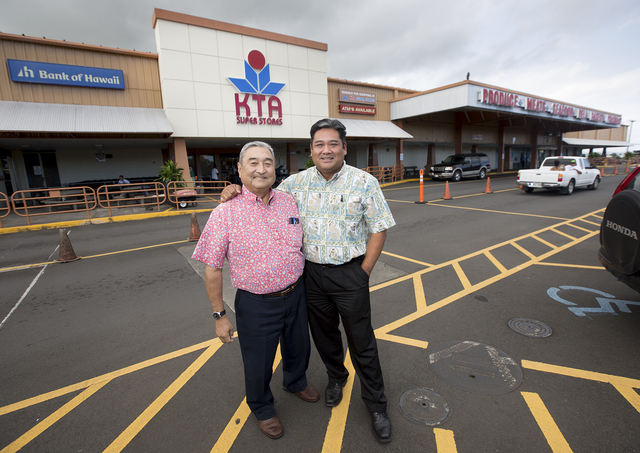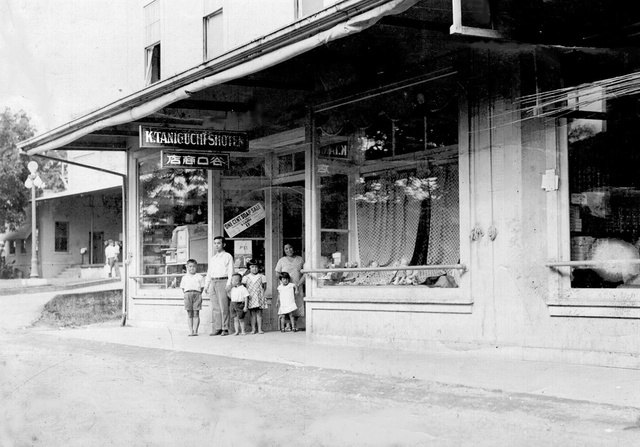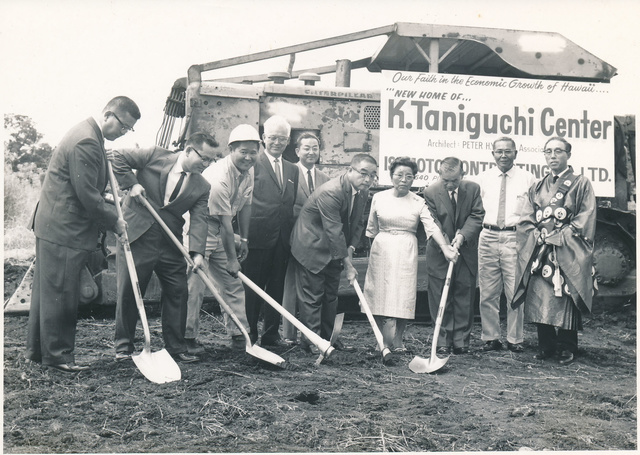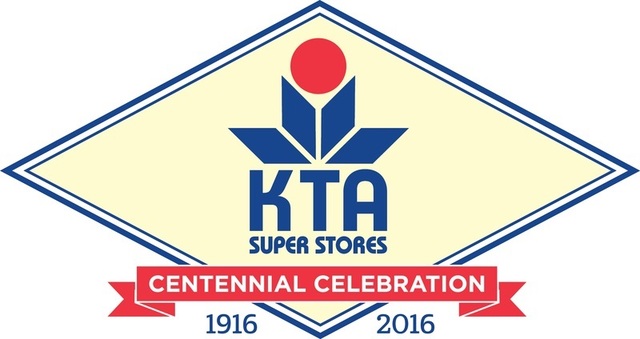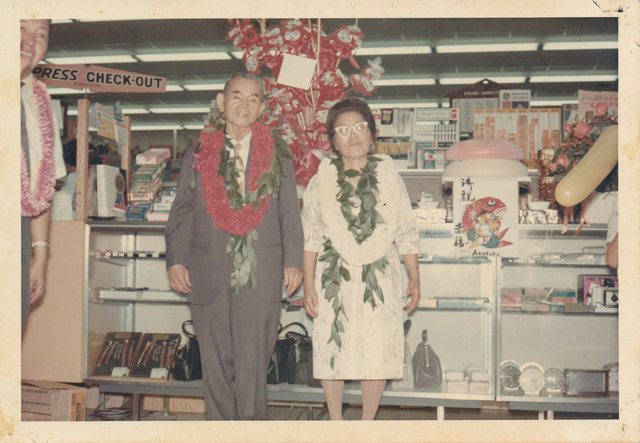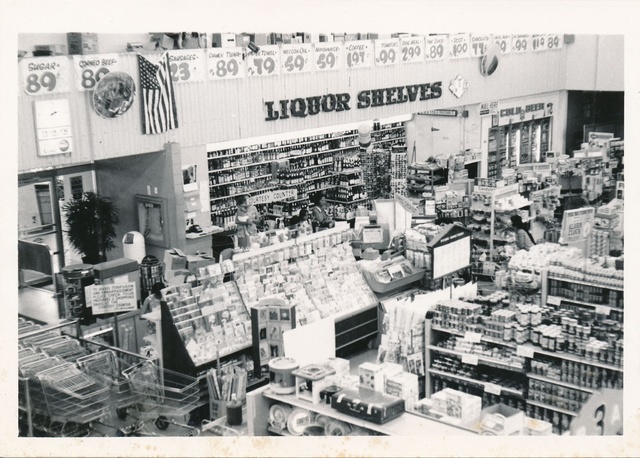Happy Birthday, KTA: Beloved supermarket chain turns 100
KTA mid-day
ADVERTISING
Plenty retired people
Man this place is packed!
“KTA: A Haiku,” by local teacher and children’s choir director Jenifer Becker Tsuji, illustrates KTA Super Stores’ place in the Hawaii Island community and local culture, as well as its status as a thriving business.
The retirees Tsuji mentions likely have shopped at KTA their entire lives, as their families have for generations.
The six-store, islandwide supermarket chain, which started as a modest mom-and-pop operation, is celebrating a century of serving the Big Island in 2016.
Sometime in 1916 — the exact date is unknown — Koichi and Taniyo Taniguchi, an immigrant couple from Japan, opened K Taniguchi Shoten, a 500-square-foot grocery and dry goods store on Lihiwai Street in the Waiakea Town area of Hilo. Their grandson, Barry Taniguchi, is now the chairman and CEO, while great-grandson Toby Taniguchi is president and chief operating officer.
“We’ve been through natural disasters, whether it be tsunamis or tropical storms, and cycles in the financial markets where times are tough,” Toby Taniguchi said. “It’s a momentous occasion, and I’m humbled by it.”
Barry Taniguchi said his grandfather used the adage “the customer is always right” as a guiding principle of the business.
“In other words, we always try to please the customer, and service them the best we can. I think it’s those relationships that allowed us to continue over the years,” he said.
In the beginning, Taniyo Taniguchi minded the store while watching the couple’s first-born son, Yukiwo, Barry’s father. Koichi Taniguchi took orders from around Hilo and from the workers on the sugar plantations. He then delivered the groceries on bicycle.
“In the old days, (wage) payment used to be once a month, not twice a month like you have now,” Barry Taniguchi said. “So, we’d let them charge for the month, and next month, you’d pay when you get paid. When they were on strike, you know until they settled, they wouldn’t have any means of payment, but you’ve still got to eat, so my grandfather would let them charge until the end of the strike. And most of the accounts, it might have taken a little longer, but they were honest. They paid. And that helped them out.”
The Taniguchis built a loyal customer base which allowed them to expand the business. The downtown Hilo store, at the corner of Keawe and Mamo streets, opened in 1939.
“For a period of time, there were two stores: Waiakea Town and downtown Hilo,” Barry Taniguchi said. “It was the 1946 (April Fool’s Day tsunami) wave that destroyed the Waiakea store; then they consolidated the operations in downtown Hilo. In 1953, they started expanding the downtown location.”
Barry Taniguchi started working at the downtown store at age 12, operating the courtesy counter. He said his main job was cashing workers’ paychecks.
“Back then, almost nobody had a checking account; our courtesy counter acted as the bank for them,” he said.
KTA opened in Kailua-Kona in 1959. Yukiwo Taniguchi was picking up merchandise to take to the Kona store when the May 23, 1960, tsunami devastated downtown Hilo.
“He was at the downtown store, loading stuff into the car, when the wave hit, and he just ran in,” Barry Taniguchi said. “Fortunately, there were two stories, and he ran upstairs. Had he stayed outside with the car, he would have probably been killed. The car itself moved about 25 yards away when the water hit. The water went through the store, as well as under the store. In those days, the refrigeration equipment, the compressors, all of it, was under the store. All of that was destroyed. We had to bring in new compressors and refrigeration equipment.”
The downtown Hilo store is still in operation today, and the Puainako store on the southern outskirts of Hilo opened in 1966. The Kailua-Kona store moved to its Palani Road location in 1975. Another Kona location, Keauhou, opened in 1984. The Waimea store followed in 1989, with a partner location, Waikoloa Village Market, opening in 1990.
KTA employs about 800 people companywide, making it one of the largest private-sector employers on the island.
There was, and is, competition from a number of sources: the former Sure Save and Food Fair supermarkets, both since closed, the Foodland chain from Oahu — which also includes Sack N Save and Malama Market — and Safeway, which recently upgraded with an ultra-modern store in Hilo. There also are big-box stores such as Walmart and Target, which have grocery sections, and Costco, which sells grocery items mostly in bulk. Through it all, KTA has retained its loyal customer base.
Barry Taniguchi said customer loyalty, the quality of KTA’s employees, and a focus on local products are three of the things that have helped the grocery chain keep up with its competition.
“Without them coming to patronize us, we would have never survived,” Barry Taniguchi said. “I think the first, the primary reason is our employees, our associates. I get so many (positive) comments from customers about our employees. I think the secondary reason is the flavor of our products. We do carry all the mainland products, of course, but we also carry a lot of local products that the other stores probably don’t have. To that end, Mountain Apple Brand, where we partner with local producers, I hope, drives some of that loyalty.”
Mountain Apple Brand was trademarked 15 years before its 1992 launch by second-generation KTA president Tony Taniguchi, who died in 1989 at age 59. Barry Taniguchi described his Uncle Tony as “a visionary” who foresaw the demise of the sugar industry long before it became a reality. He said his uncle and Derek Kurisu, a KTA executive vice president, conceived Mountain Apple Brand as a way to help displaced sugar workers who wanted to remain in agriculture market their products.
“He sat down with Derek one day and said, ‘We’ve really got to think about how we’re going to help these ag workers,’” Barry Taniguchi recalled. “And together, they came up with the brainstorm. And like (what Maui Sugar &Commercial) is going through right now, the thought was that some of these sugar workers would get into diversified ag and do other things related to food, and we could do something to help them get started.”
Locally produced milk was the first Mountain Apple Brand product. There is now a plethora of offerings bearing the Mountain Apple Brand label, all locally grown and produced, including fresh eggs, bananas, range-fed beef and island lamb, coffee, baked goods, and numerous ethnic food preparations.
The exuberant Kurisu also conceived and hosts KTA’s long-running television show, “Living in Paradise,” and its spin-off series, “Seniors Living in Paradise.” Both run twice daily on Oceanic Time Warner Cable channel 27.
“We live in a great place, but the problem is people don’t realize that,” Barry said. “How do you share that? But Derek went out and he started videotaping good things. It’s a communication tool. It’s done really well for us. Derek has the philosophy, you go out and videotape kids, the parents and grandparents are going to watch it.”
And it appears from the success of “Seniors Living in Paradise,” the reverse is also true.
Both Barry and Toby Taniguchi are hands-on when it comes to the community. Both serve on the boards of numerous local nonprofit organizations, although they make it a point not to serve on the same boards.
For Barry Taniguchi, who has turned over the day-to-day operations of KTA to his son, community service has become a full-time endeavor, and Toby Taniguchi has the task of leading the company into its second century.
“Looking forward, we do have an eye on improving and increasing our use of technology. The challenge with that is, it changes so quickly. With a little luck, as we move forward and as we select key partners for technology, hopefully that will be a big piece of the plan,” Toby Taniguchi said.
The Keauhou store has undergone a recent renovation, including equipment upgrades and new energy-efficient lighting. The company also is looking to expand to new locations, although Toby Taniguchi said nothing has been finalized.
“It would increase our ability to better serve the community of Hawaii Island,” he said. “And I also think it affords an ability for our associates to grow. If you open a brand-new store, you get a new store director, you get a deli manager, there are more opportunities. So sticking with our core philosophies of our founder, utilizing technology to increase efficiency, adding more square footage to better serve our communities, I think that’s all a part of our vision, going forward.”
Toby Taniguchi described KTA’s century in business as a “momentous and humbling” accomplishment and said he’s “grateful for everything and everyone who has been a part of the organization and who has helped support the organization and has stuck with the organization through good times and bad.”
“When you look back and you look at the persistence, the dedication and the incredible hard work of everybody that has come before those who are here today, it’s a feeling of gratitude and almost indebtedness to those who came before you,” he said.
“The Japanese call that on giri, the concept of feeling indebted to those who came before you and an obligation to do things in a way that honors them.”
Special centennial promotions and celebrations are planned for each KTA location.
In January, the downtown Hilo KTA celebrates Founders Day from 9 a.m. to 4 p.m. on Saturday, Jan. 30, with prime rib plates, hot dogs, shave ice and free cake, plus the Waiakea Ukulele Band, Filipino dancing, taiko drumming and karaoke with Cary &Friends.
Every Saturday in January is Cultural Day at the Keawe Street store from 9 a.m. to 2 p.m. with entertainment and food specials.
There are also food demos and giveaways every Friday in January at the downtown Hilo location.
Similar celebrations will occur at other KTA locations through June, with one store each month getting the spotlight — Waimea (February), Keauhou (March), Waikoloa (April), Kailua-Kona (May) and Puainako (June).
Email John Burnett at jburnett @hawaiitribune-herald.com.


